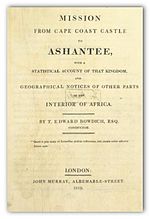Thomas Edward Bowdich
Thomas Edward Bowdich (born June 20, 1791 in Bristol , † January 10, 1824 at Bathurst ) was a British adventurer, author and zoologist .
With the support of his uncle J. Hope-Smith , the governor of the British Gold Coast settlements, he got a job as a secretary in the service of the African Company of Merchants and was sent to Cape Coast in 1814 . In 1817, just three years later, he and two colleagues were sent to Kumasi to see the King of Ashanti on a mission whose aim was to secure British control over the inhabitants of the coast. Thanks to the diplomatic skills of Thomas Edward Bowdich in particular, it was successfully completed. In 1818 Bowdich returned to England and a year later published the report on his Mission Mission from Cape Coast Castle to Ashantee, & c. and his observations in Kumasi. He donated his African collection to the British Museum. Bowdich publicly attacked the leadership of the African Committee . His advice was fundamental in the UK government's takeover of direct control of the Gold Coast.
Bowdich lived in Paris from 1820 to 1822, where he studied mathematics and science. He had a close relationship with Georges Cuvier , Baron von Humboldt and other natural scientists. During his stay in France, Bowdich wrote various works on Africa as well as scientific papers. From a zoological point of view, his most important work was An analysis of the natural classifications of Mammalia, for the use of students and travelers , in which he recognized three systematic groups of mammals as belonging together and described their characteristics: the predators (Carnivora), rodents (Rodentia) and insectivores (Insectivora).
On January 10, 1824, he died of malaria while surveying what is now the Gambia .
Works
- Mission from Cape Coast Castle to Ashantee (London 1819)
- An analysis of the natural classifications of Mammalia, for the use of students and travelers (Paris, 1821)
- An Account of the Discoveries of the Portuguese in ... Angola and Mozambique (London, 1824)
- Excursions in Madeira and Porto Santo ... to which is added a Narrative of the Continuance of the Voyage to its Completion (London, 1825)
| personal data | |
|---|---|
| SURNAME | Bowdich, Thomas Edward |
| ALTERNATIVE NAMES | Bowdich, TE |
| BRIEF DESCRIPTION | British adventurer, author and zoologist |
| DATE OF BIRTH | June 20, 1791 |
| PLACE OF BIRTH | Bristol |
| DATE OF DEATH | January 10, 1824 |
| Place of death | Banjul |

